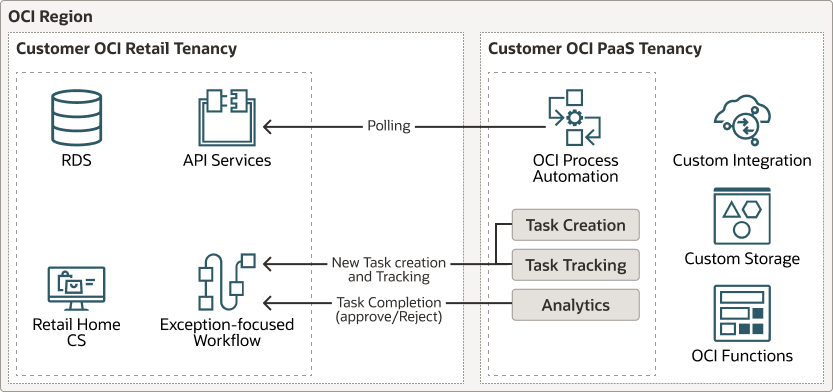Use Enterprise Workflow Management for Oracle Retail Using OCI Process Automation
Exception-based dashboard notifications and alerts represent some retail industry best practice workflows used for daily tasks. Extensions for specific use cases can be achieved by creating tasks using Oracle Cloud Infrastructure Process Automation and integrating them into mail workflows, increasing the level of control and automation across the enterprise.
Architecture
This architecture illustrate how to extend workflow capabilities of the Oracle Retail suite of applications using OCI Process Automation.
The following diagram illustrates this reference architecture.
oci-retail-tenancy-process-automation-diagram-oracle.zip
A new workflow can be created using OCI Process Automation. This workflow can be integrated into Oracle Retail's exception-based workflow by following these steps:
- Perform a polling process to obtain the data that needs to be worked upon (for example, obtain a list of all the items that are missing mandatory custom attributes).
- Create a new task in OCI Process Automation to send tasks to the Oracle Retail workflow.
- Once invoked, complete the task in OCI Process Automation, sending back acknowledgment of approval or rejection of the task to the Oracle Retail workflow.
The architecture has the following components:
- Integration
Oracle Integration is a fully managed service that allows you to integrate your applications, automate processes, gain insight into your business processes, and create visual applications.
- Integration for SaaS
Oracle Integration is a fully managed service that allows you to integrate your applications, automate processes, gain insight into your business processes, and create visual applications.
Oracle Integration for SaaS, a streamlined version of Oracle Integration, gives you the features and benefits of Oracle Integration with a focus on SaaS.
- LoggingLogging is a highly scalable and fully managed service that provides access to the following types of logs from your resources in the cloud:
- Audit logs: Logs related to events emitted by the Audit service.
- Service logs: Logs emitted by individual services such as API Gateway, Events, Functions, Load Balancing, Object Storage, and VCN flow logs.
- Custom logs: Logs that contain diagnostic information from custom applications, other cloud providers, or an on-premises environment.
- Service connectors
Oracle Cloud Infrastructure Service Connector Hub is a cloud message bus platform that orchestrates data movement between services in OCI. You can use service connectors to move data from a source service to a target service. Service connectors also enable you to optionally specify a task (such as a function) to perform on the data before it is delivered to the target service.
You can use Oracle Cloud Infrastructure Service Connector Hub to quickly build a logging aggregation framework for security information and event management (SIEM) systems.
- Process Automation
Oracle Cloud Infrastructure Process Automation is a native service for developers and business experts to quickly automate approval workflows that span your ERP, HCM, and CX systems. Simplify repetitive tasks with reusable business rules, pre-built integrations, and low-code designers.
